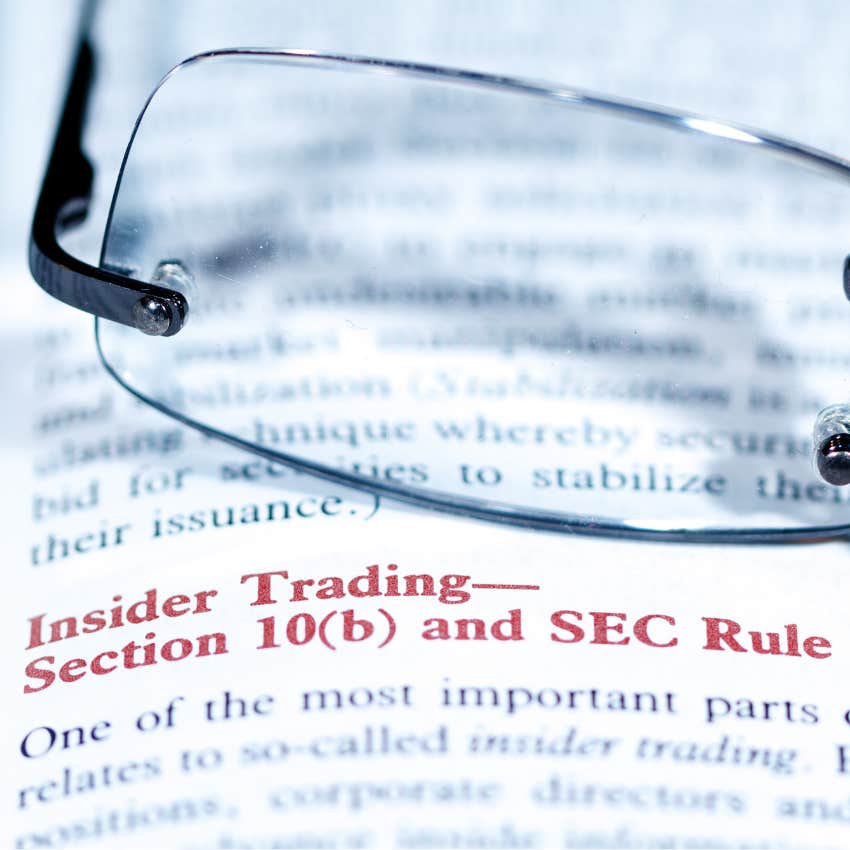A Man Is Likely Going To Prison After Eavesdropping On His Now Ex-Wife's Work-From-Home Meetings
He used her meetings for hot stock tips. Now they're divorcing and he's likely headed to jail.
 LightField Studios / Shutterstock.com
LightField Studios / Shutterstock.com Most of us have found it irresistible to listen in on a phone call or overheard conversation once or twice in our lives. But for Tyler Loudon, his nosiness has left him with felony charges and a potential prison sentence.
Loudon made stock trades with info gleaned from eavesdropping on his wife's work-from-home meetings.
Like many people since the pandemic, Loudon, a 42-year-old man from Houston, shared a home office with his wife, a mergers and acquisitions executive at the British oil and gas company BP. And when his wife began working on a new acquisition for the company, Loudon couldn't help but listen in, to the tune of nearly two million dollars in very profitable — and highly illegal — stock profits.
Loudon overheard his wife discussing BP's acquisition of a truck stop company and went on a stock buying and selling spree.
In early 2022, Loudon overheard his wife discussing BP's acquisition of truck stop company TravelCenters of America while they were sharing a home office. In December of that year, Loudon then went on a buying spree of TravelCenters of America's stock, paying for it with some $2.16 million worth of sales of other stocks in a brokerage account and his Roth IRA.
He bought 46,450 shares in all, never telling his wife about the transactions.
 Photo: Stuart Monk / Shutterstock
Photo: Stuart Monk / Shutterstock
Once the BP merger was officially announced in February 2023, the company's stock price soared by more than 70%, and Loudon immediately sold all his shares for a tidy $1.7 million profit.
If this seems like cheating to you, you're definitely onto something: Loudon's actions are a clear case of insider trading, a federal felony. Unfortunately for Loudon, he would not be as lucky as many other "white collar criminals" who get away with insider trading all the time.
Financial regulators began scrutinizing BP employees' financial records including Loudon's wife's.
In March 2023, the Financial Industry Regulatory Authority, or FINRA, requested information from BP about the merger. Their probe resulted in BP's lawyers examining several employees' personal financial information.
When Loudon learned from his wife that she would likely be included in that scrutiny, he knew his goose was cooked and came clean about the insider trading, though not the extent of it.
Regardless, his wife was "stunned" according to the SEC's filings on the matter, and blew the whistle to BP. They subsequently terminated her despite having determined from her texts and emails that she did not knowingly leak any information to her husband.
Having pleaded guilty to insider trading, Loudon faces a $250,000 fine, up to five years in prison, and his wife is divorcing him.
The SEC's complaint said that Loudon's wife immediately moved out of their home and "generally ceased all contact with Loudon" after he came clean, and she has since initiated divorce proceedings. But it seems likely that will be the least of Loudon's worries.
In an email to the New York Times, Loudon's lawyer, Peter Zeidenberg, said he had "made a terrible mistake in judgment for which he has taken full responsibility." But of course, mea culpas don't hold much weight with the feds.
 Photo: Chad McDermott / Shutterstock
Photo: Chad McDermott / Shutterstock
Loudon has pleaded guilty to securities fraud and faces up to a quarter million dollars in fines and five years in prison when he is sentenced on May 17. He has also been forced to forfeit the $1,763,522 in profits he made on his stock purchases and sales to the United States government.
Insider trading is rampant in the hedge fund industry and among members of Congress, who get away with it due to gray areas in the law.
On one hand, it's hard to argue with Loudon getting his comeuppance. The law is the law after all. But his case has been controversial given the role that insider trading — or at least activity that seems an awful lot like it —has long played in both the hedge fund industry and Congress.
Insider trading is often difficult to legally define, and playing on these gray areas and loopholes to use non-public information to inform investment moves is quite literally the backbone of hedge funds.
In Washington, members of both parties have been involved in congressional insider trading scandals in which members used non-public information they were privy to while sitting on regulatory committees to inform stock trades. Most notably, members of Congress used this access to sell off stocks in advance of the February 2020 stock market crash in response to the COVID-19 pandemic.
But Congress members' involvement in insider trading, or at least, apparent conflicts of interest, goes well beyond that egregious 2020 activity. So much so that an entire cottage industry of consultants who track and compile the stock market activity of members of Congress like Nancy Pelosi and Mitch McConnell, for example, sell that information to investors in the general public.
The problem is so rampant in Congress that Representative John Ossoff and Senator Mark Kelly have introduced legislation that would ban members of Congress from participating in the stock market at all.
Loudon may have knowingly broken the law, but the nearly $2 million he made is a drop in the bucket compared to the trillion-dollar hedge fund industry, or the nine-figure net worths of many members of Congress of both parties who are making money hand over fist with the information they glean from running our government — all while drawing a salary from our tax dollars, no less.
John Sundholm is a news and entertainment writer who covers pop culture, social justice and human interest topics.

